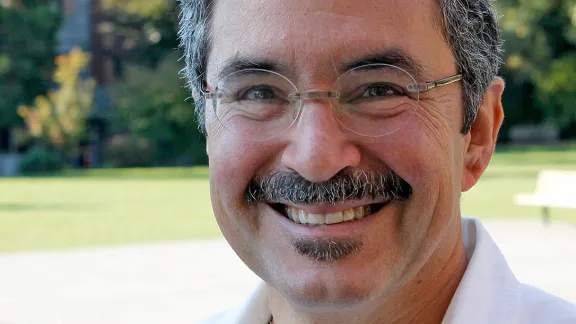
Anson Laytner. Photo: Private
By Anson Laytner
I started to help working to put together the international interfaith symposium “Religious Identity and Renewal: Jewish, Christian and Muslim Explorations” shortly after the idea was conceived by Dr Simone Sinn and Dr Michael Trice. The symposium, co-organized by the Lutheran World Federation and Seattle University, School of Theology and Ministry, will take place 10–14 August 2014, at Seattle University.
Gatherings like this aren’t made in the twinkling of an eye. Ideas take a lot of hard work by many people to bring them to fruition. For months now, we, at Seattle University, and our colleagues at the LWF in Geneva have been creating and polishing the program, researching and inviting attendees, handling flight and visa arrangements, attending to flight arrival and departure times, room assignments, site-seeing options and food plans. Speaking of the latter: Between keeping kosher or halal, not to mention vegan or vegetarian, gluten free or other dietary restrictions, this became a major concern for us. If Christians had a religious obligation to eat pork, we would really have been in trouble!
All this is (almost) behind us now and we believe that we are set to welcome our domestic and international guests on August 8, 9 or 10, depending on what time of the day or night they arrive.
To welcome scholars from Estonia, Ethiopia, Germany, India, Indonesia, Israel, the Netherlands, South Africa, Sweden, Tanzania and the USA is exciting enough, but what excites me the most is the opportunity to hear what these academics from such diverse countries and faiths have to say about the topic of religious identity in the modern era.
Jews Wrestling With Question of Identity
Having invented the issue of “modernity”—by which I mean the process of secularization brought on the by Enlightenment—European and North American Christians have had several centuries to explore its impact on their national and religious identities. When religion and ethnic (or national) identity are so closely intertwined, how can a member of a minority denomination or ethnicity belong to the larger whole? When religious authority and state power are merged, how do adherents of dissenting denominations or faiths survive? Can or should a state church dictate belief—and if so, at what cost? Much ink—and even more blood—has been spilt in the attempt to resolve these questions. And the controversy still continues even if abated.
European Jews—and their North American counterparts—have had nearly as much time, depending on when they were emancipated and integrated into their host countries. Jews around the world still wrestle with the question of identity brought on by the European Enlightenment: Are Jews a nation-in-exile, resident aliens wherever they live, are they an ethnic group with a shared religion, or are they a religion pure and simple? And as if this weren’t hard enough to figure out, how do these interlocking questions come to be played out in the relatively new state of Israel? How is Israel “a Jewish state”? A state comprised primarily of and for Jews? Jewish by religion? Jewish by nationality? Is Israeli synonymous with Jewish? What about minority rights? These remain hot-button issues not only for Israeli Jews and for Jews in the Diaspora as well, but with serious ramifications for Palestinians, and with implications for Christians and Muslims worldwide too.
Muslims and Christians from the global South are now confronting the issues raised by the Enlightenment with an intensity that ought to remind Western Christians and Jews of our own past struggles. As Muslims around the world confront “modernism” in the form of global Western cultural influences and residual colonialism, they must grapple with a faith still defined by its roots in an earlier era. How is Science affecting Faith? Can the Muslim faith co-exist with modernity or is a violent confrontation and rejection the only option? And what does it mean to be a Muslim? Is the faith best expressed in an Arab cultural form, which some claim to still be the original, i.e. “true” Islam or can the faith legitimately express itself in multiple cultural forms? Where is the line between culture and faith? What is shared as a common value and what may be rejected as being culturally distinct?
What Fundamentalism Tells Us
Each faith group deals internally with these questions, but in our global world today, the boundaries are porous, so that what goes on in one faith community may have an impact on the others. Consider the growth of fundamentalism in all three of our faiths: this common feature tells us something important—but what exactly? Is fundamentalism more “true” than a liberal faith? Can fundamentalists co-exist peaceably with their more liberal counterparts? Can fundamentalists of different faiths co-exist peaceably or would their triumph herald an era of renewed religious warfare?
Finally, what is our role in shaping our future on this planet? None of our religions is primarily quietist; all three demand engagement with the world. So are scholars meant just to study, reflect and teach or is there a role for the scholar as activist? And if not us, then who?
It’s an important symposium topic—and I can’t wait to welcome everyone and get started.
Anson Laytner is the Interreligious Initiative Program Manager at Seattle University’s School of Theology and Ministry. A rabbi by training (and heterodox in practice), he is the author of Arguing with God: A Jewish Tradition and The Animals’ Lawsuit Against Humanity. His work in progress is entitled: “Letting Go of God: I Know There Is A God—I Just Don’t Know What S/He Does.”


